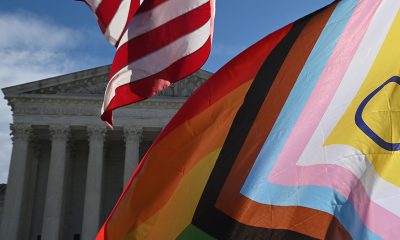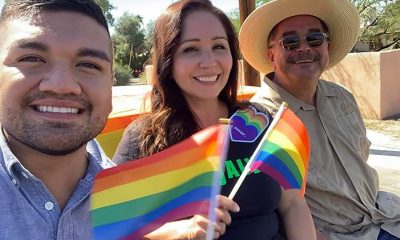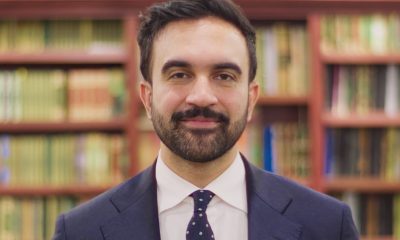National
Matthew Shepard book creates uproar
Laramie sheriff calls writer’s claims about 1998 murder ‘conspiracy theory BS’
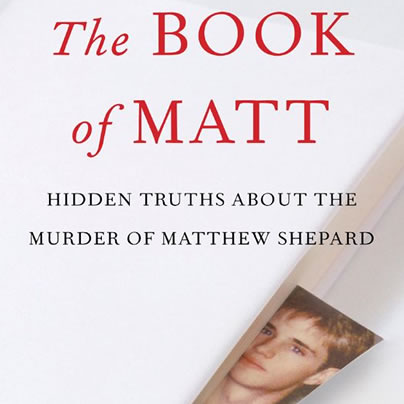

A new book claims Matthew Shepard sold crystal meth and worked as an escort. His family said it won’t respond to ‘conspiracy theories.’
A newly published book that claims gay University of Wyoming student Matthew Shepard had a sexual relationship with his killer and his 1998 murder wasn’t a hate crime has triggered expressions of outrage by LGBT activists and fueled efforts by anti-gay groups to downplay the need for hate crimes laws.
“The Book of Matt: Hidden Truths About the Murder of Matthew Shepard,” written by gay journalist Stephen Jimenez and officially released on Tuesday, comes on the eve of the 15th anniversary of Shepard’s murder in Laramie, Wyo.
It also comes at a time when the “Laramie Project,” the internationally acclaimed play about the Shepard murder and its portrayal of the slaying as a hate crime, is about to open at the Ford’s Theater in Washington with a newly produced epilogue.
In addition, a documentary film called “Matt Shepard is a Friend of Mine,” directed by a filmmaker who was one of Shepard’s high school friends, is scheduled to premiere at the Washington National Cathedral on Oct. 4.
With the play and film exploring the Shepard murder as a hate crime that adversely impacted an entire community beyond the scope of an individual victim, the startling assertions made in Jimenez’s book have prompted at least one prominent gay commentator to reassess longstanding assumptions about the Shepard case.
“Events are more complicated than most politicians and activists want them to be,” said gay conservative commentator Andrew Sullivan. “No one should be afraid of the truth.”
Among the book’s claims is that Shepard, 21, knew and socialized with Aaron McKinney, also 21, one of two men convicted of his murder, at least a year before the crime. According to Jimenez’s stated findings in the book, Shepard and McKinney each used and sold crystal meth, both had been involved with an escort service in Denver and Laramie that arranged for them to have sex for money with men, they were seen at the same parties in Laramie, and the two occasionally had sex with each other.
Jimenez told the Blade he devoted more than 13 years of research and investigative reporting in preparation for his book, interviewing more than 100 people on the record, including a dozen people he identifies as friends of Shepard and more than a dozen friends of McKinney.
But some of the national LGBT advocacy groups have joined the Matthew Shepard Foundation, which was created by Shepard’s parents to combat anti-LGBT violence, in challenging the accuracy of the book and the credibility of its sources.
“Attempts now to rewrite the story of this hate crime appear to be based on untrustworthy sources, factual errors, rumors and innuendo rather than the actual evidence gathered by law enforcement and presented in a court of law,” a statement released by the Shepard Foundation says.
“We do not respond to innuendo, rumor or conspiracy theories,” the statement says. “Instead we remain committed to honoring Matthew’s memory, and refuse to be intimidated by those who seek to tarnish it.”
Albany County, Wyo., Sheriff David O’Malley, who served as Laramie police commander at the time of the murder, told the Blade on Tuesday that he believes the book “is full of lies” and described it as “conspiracy theory BS.”
Jimenez said he and others working with him have thoroughly and meticulously scrutinized and vetted the findings of his investigation, which he says included a careful reading of virtually all of the police and court records related to the case that initially had been sealed by a judge.
Laramie officials have said the records became available to the public in late 1999 shortly after the conclusion of the trial of McKinney, who was convicted of bludgeoning Shepard to death by repeatedly striking him in the head with the barrel of a .357 Magnum pistol while Shepard was tied to a fence at an isolated prairie just outside of town.
Co-defendant Russell Henderson confessed to having tied Shepard to the fence while accompanying McKinney on what he said began as a plan by McKinney to lure Shepard from a Laramie bar to rob him. Unlike McKinney, Henderson pleaded guilty to a murder charge rather than face a trial. Both men were sentenced to life in prison without the possibility of parole.
“I think the discovery of who Matthew Shepard was as a person and the complexity of who he was as a human being is really important,” Jimenez told the Blade.
“And so my reason for writing the book is to really say let’s understand what was really going on here,” he said. “If we’re serious about dealing with hate and violence in the culture, let’s understand what really happened here. What are the forces that came into play that created this grotesquely violent murder?”
Added Jimenez: “And certainly as I know now, the official story that these were two strangers that walked into a bar and targeted Matthew because he looked well-dressed and looked like he had money and appeared to be gay or that Matthew came on to them in the bar or that they lured him out of the bar because he was gay – those are simply not true.”
Jimenez was referring to the findings in the official police report that was based in part on a confession by McKinney to police at the time of his arrest three days after the murder. In his confession, McKinney said he and Henderson planned to rob Shepard, not to kill him. He said he lost control of his emotions and actions after Shepard allegedly groped him in the pickup truck that Henderson was driving after Shepard accepted McKinney’s invitation to drive him home from the Fireside bar on the night of Oct. 6, 1998.
McKinney’s lawyers, who attempted to invoke the so-called “gay panic” defense at McKinney’s trial, told the jury in his November 1999 closing argument that McKinney’s judgment was clouded that night by his consumption of alcohol and his use of and addiction to crystal meth amphetamine.
“Aaron McKinney is not a cold-blooded killer,” defense attorney Dion Custis said. “What happened is he hit him too many times” after the crystal meth consumption and Shepard’s alleged groping caused him to fly into an “uncontrollable rage.”
LGBT advocacy groups, noting that perpetrators of anti-gay hate crimes often use the gay panic defense as an alibi, said at the time that McKinney’s use of the gay panic defense confirmed their belief that McKinney’s motive was anti-gay hatred.
O’Malley said the police investigation found that McKinney had not been using crystal meth for several days and that investigators concluded that the murder “had nothing to do with drugs.” He said that the incident started as a robbery but investigators believe the brutality of the beating, in which McKinney crushed Shepard’s skull, involved a form of “overkill” that indicated the true motive was anti-gay animus.
Jimenez argues in his book that McKinney was suffering from the effects of his crystal meth use at the time of the attack but that some of his animus toward Shepard was based on alleged conflicts over a drug deal at a time when the two were working for rival drug suppliers. He bases this theory on information from both named and anonymous sources.
“It boggles the mind that this book flies in the face of all of the evidence related to the drug use,” said Cathy Renna, a former official with Gay & Lesbian Alliance Against Defamation (GLAAD), who attended the McKinney trial.
“Aaron McKinney has changed his story so many times it’s not even worth trying to keep count,” said Renna in referring to subsequent statements that McKinney has made to reporters in interviews from jail.
“But the one thing that Aaron McKinney has been clear about and has remained consistent to is that he didn’t know Matt beforehand.”
Renna and others questioning the reliability of Jimenez’s sources have cited a memo that ABC News correspondent Elizabeth Vargas mistakenly left at O’Malley’s residence in 2004, when she interviewed O’Malley, as confirmation that Jimenez reached his conclusions about the Shepard case before he began research for a controversial report on the ABC program 20/20. The memo, according to critics who have seen it, outlined the view the Shepard murder was not a hate crime along with some of the other revelations recounted in the Jimenez book.
Jimenez, however, told the Blade that the criticism is unfounded because his memo was based on more than two years of research that he already had conducted on the case long before he became involved in the 20/20 project.
He also disputes claims by critics that the 20/20 broadcast on the Shepard case in 2004 was based on unreliable sources.
“When I did the ABC News story every single note, every single interview transcript, everything we did was vetted by the top vice presidents and lawyers at ABC,” Jimenez said.
Concerning his book, Jimenez notes that the lead prosecutor in the Shepard murder case, Cal Rerucha, has stated on the record in his book that he agrees that the preponderance of evidence shows that drugs rather than anti-gay hate was the motive behind the murder of Matthew Shepard.
Regardless of whether the claims in Jimenez’s book are correct or not, some LGBT activists question the purpose of such a book, which they note has already been cited by right-wing anti-gay organizations to question the validity of hate crime legislation.
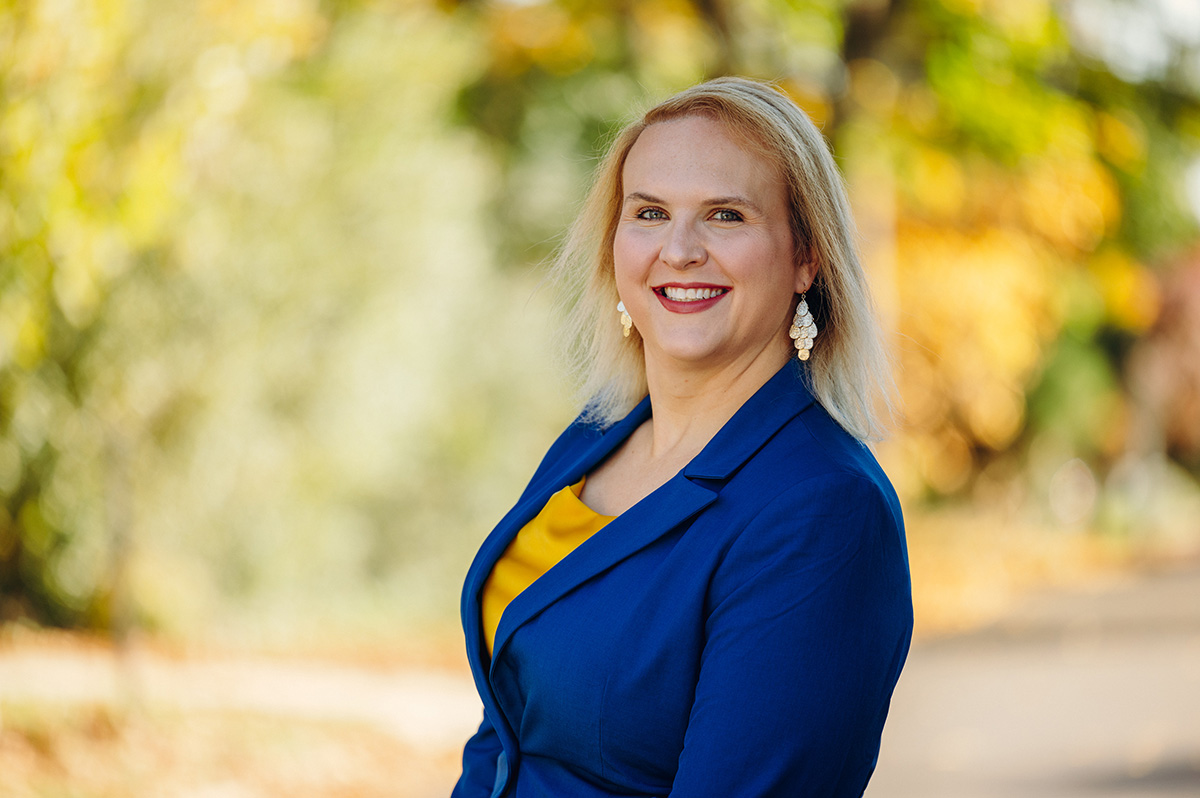
Erica Deuso will become the first openly transgender mayor in Pennsylvania.
Voters in Downingtown elected Deuso on Tuesday with 64 percent of the vote, according to the Philadelphia Inquirer. The Democrat ran against Republican Richard Bryant.
Deuso, 45, currently works at Johnson & Johnson and has lived in Downingtown since 2007. The mayor-elect is originally from Vermont and graduated from Drexel University.
Deuso released a statement following her election, noting that “history was made.”
“Voters chose hope, decency, and a vision of community where every neighbor matters,” Deuso stated. “I am deeply honored to be elected as Pennsylvania’s first openly transgender mayor, and I don’t take that responsibility lightly.”
According to a LGBTQ+ Victory Institute report released in June, the U.S. has seen a 12.5 percent increase in trans elected officials from 2024 to 2025. Still, Deuso’s campaign did not heavily focus on LGBTQ policy or her identity. She instead prioritized public safety, environmental resilience, and town infrastructure, according to Deuso’s campaign website.
Deuso has served on the boards of the Pennsylvania Equality Project, PFLAG West Chester/Chester County, and Emerge Pennsylvania, according to the LGBTQ+ Victory Fund. She is also an executive member of the Chester County Democratic Committee.
“This victory isn’t about one person, it’s about what happens when people come together to choose progress over fear. It’s about showing that leadership can be compassionate, practical, and focused on results. Now the real work begins, building a Downingtown that is safe, sustainable, and strong for everyone who calls it home,” Deuso said.
Downingtown has a population of more than 8,000 people and is a suburb of Philadelphia. The town’s current mayor, Democrat Phil Dague, did not seek a second term.
Janelle Perez, the executive director of LPAC, celebrated Deuso’s victory. The super PAC endorses LGBTQ women and nonbinary candidates with a commitment to women’s equality and social justice, including Deuso.
“Downingtown voters delivered a resounding message today, affirming that Erica represents the inclusive, forward-looking leadership their community deserves, while rejecting the transphobic rhetoric that has become far too common across the country,” Perez said. “Throughout her campaign, Erica demonstrated an unwavering commitment to her future constituents and the issues that matter most to them. LPAC is proud to have supported her from the beginning of this historic campaign, and we look forward to the positive impact she will have as mayor of Downingtown.”
Deuso will be sworn in as mayor on Jan. 7.
U.S. Supreme Court
LGBTQ legal leaders to Supreme Court: ‘honor your precedent, protect our families’
Experts insist Kim Davis case lacks merit
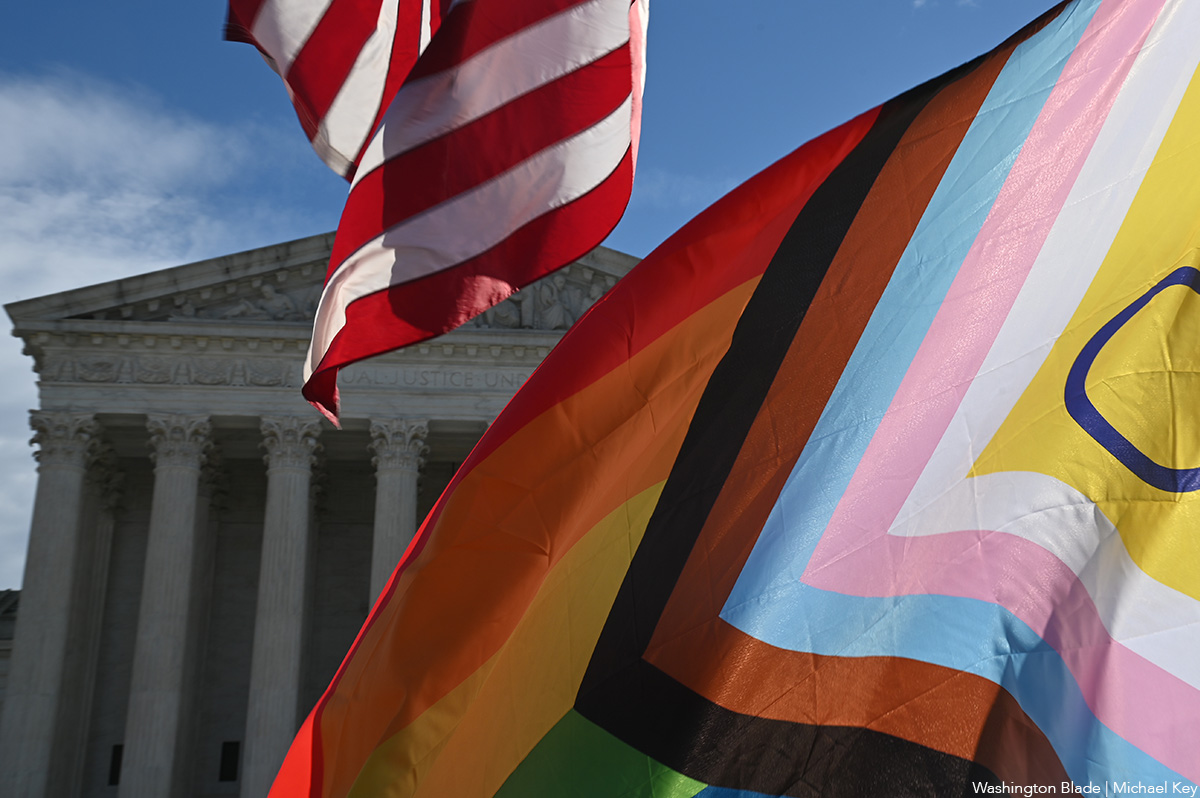
The U.S. Supreme Court considered hearing a case from Kim Davis on Friday that could change the legality of same-sex marriage in the United States.
Davis, best known as the former county clerk for Rowan County, Ky., who defied federal court orders by refusing to issue marriage licenses to same-sex couples — and later, to any couples at all — is back in the headlines this week as she once again attempts to get Obergefell v. Hodges overturned on a federal level.
She has tried to get the Supreme Court to overturn this case before — the first time was just weeks after the initial 2015 ruling — arguing that, in her official capacity as a county clerk, she should have the right to refuse same-sex marriage licenses based on her First Amendment rights. The court has emphatically said Davis, at least in her official capacity as a county clerk, does not have the right to act on behalf of the state while simultaneously following her personal religious beliefs.
The Washington Blade spoke with Karen Loewy, interim deputy legal director for litigation at Lambda Legal, the oldest and largest national legal organization advancing civil rights for the LGBTQ community and people living with HIV through litigation, education, and public policy, to discuss the realistic possibilities of the court taking this case, its potential implications, and what LGBTQ couples concerned about this can do now to protect themselves.
Loewy began by explaining how the court got to where it is today.
“So Kim Davis has petitioned the Supreme Court for review of essentially what was [a] damages award that the lower court had given to a couple that she refused a marriage license to in her capacity as a clerk on behalf of the state,” Loewy said, explaining Davis has tried (and failed) to get this same appeal going in the past. “This is not the first time that she has asked the court to weigh in on this case. This is her second bite at the apple at the U.S. Supreme Court, and in 2020, the last time that she did this, the court denied review.”
Davis’s entire argument rests on her belief that she has the ability to act both as a representative of the state and according to her personal religious convictions — something, Loewy said, no court has ever recognized as a legal right.
“She’s really claiming a religious, personal, religious exemption from her duties on behalf of the state, and that’s not a thing.”
That, Loewy explained, is ultimately a good thing for the sanctity of same-sex marriage.
“I think there’s a good reason to think that they will, yet again, say this is not an appropriate vehicle for the question and deny review.”
She also noted that public opinion on same-sex marriage remains overwhelmingly positive.
“The Respect for Marriage Act is a really important thing that has happened since Obergefell. This is a federal statute that mandates that marriages that were lawfully entered, wherever they were lawfully entered, get respect at the federal level and across state lines.”
“Public opinion around marriage has changed so dramatically … even at the state level, you’re not going to see the same immediate efforts to undermine marriages of same-sex couples that we might have a decade ago before Obergefell came down.”
A clear majority of U.S. adults — 65.8 percent — continue to support keeping the Obergefell v. Hodges decision in place, protecting the right to same-sex marriage. That support breaks down to 83 percent of liberals, 68 percent of moderates, and about half of conservatives saying they support marriage equality. These results align with other recent polling, including Gallup’s May 2025 estimate showing 68 percent support for same-sex marriage.
“Where we are now is quite different from where we were in terms of public opinion … opponents of marriage equality are loud, but they’re not numerous.”
Loewy also emphasized that even if, by some chance, something did happen to the right to marry, once a marriage is issued, it cannot be taken back.
“First, the Respect for Marriage Act is an important reason why people don’t need to panic,” she said. “Once you are married, you are married, there isn’t a way to sort of undo marriages that were lawfully licensed at the time.”
She continued, explaining that LGBTQ people might feel vulnerable right now as the current political climate becomes less welcoming, but there is hope — and the best way to respond is to move thoughtfully.
“I don’t have a crystal ball. I also can’t give any sort of specific advice. But what I would say is, you know, I understand people’s fear. Everything feels really vulnerable right now, and this administration’s attacks on the LGBTQ community make everybody feel vulnerable for really fair and real reasons. I think the practical likelihood of Obergefell being reversed at this moment in time is very low. You know, that doesn’t mean there aren’t other, you know, case vehicles out there to challenge the validity of Obergefell, but they’re not on the Supreme Court’s doorstep, and we will see how it all plays out for folks who feel particularly concerned and vulnerable.”
Loewy went on to say there are steps LGBTQ couples and families can take to safeguard their relationships, regardless of what the court decides. She recommended getting married (if that feels right for them) and utilizing available legal tools such as estate planning and relationship documentation.
“There are things, steps that they can take to protect their families — putting documentation in place and securing relationships between parents and children, doing estate planning, making sure that their relationship is recognized fully throughout their lives and their communities. Much of that is not different from the tools that folks have had at their disposal prior to the availability of marriage equality … But I think it behooves everyone to make sure they have an estate plan and they’ve taken those steps to secure their family relationships.”
“I think, to the extent that the panic is rising for folks, those are tools that they have at their disposal to try and make sure that their family and their relationships are as secure as possible,” she added.
When asked what people can do at the state and local level to protect these rights from being eroded, Loewy urged voters to support candidates and initiatives that codify same-sex marriage at smaller levels — which would make it more difficult, if not impossible, for a federal reversal of Obergefell to take effect.
“With regard to marriage equality … states can be doing … amend state constitutions, to remove any of the previous language that had been used to bar same-sex couples from marrying.”
Lambda Legal CEO Kevin Jennings echoed Loewy’s points in a statement regarding the possibility of Obergefell being overturned:
“In the United States, we can proudly say that marriage equality is the law,” he said via email. “As the Supreme Court discusses whether to take up for review a challenge to marriage equality, Lambda Legal urges the court to honor what millions of Americans already know as a fundamental truth and right: LGBTQ+ families are part of the nation’s fabric.
“LGBTQ+ families, including same-sex couples, are living in and contributing to every community in this country: building loving homes and small businesses, raising children, caring for pets and neighbors, and volunteering in their communities. The court took note of this reality in Obergefell v. Hodges, citing the ‘hundreds of thousands of children’ already being raised in ‘loving and nurturing homes’ led by same-sex couples. The vows that LGBTQ+ couples have taken in their weddings might have been a personal promise to each other. Still, the decision of the Supreme Court is an unbreakable promise affirming the simple truth that our Constitution guarantees equal treatment under the law to all, not just some.”
He noted the same things Loewy pointed out — namely that, at minimum, the particular avenue Davis is attempting to use to challenge same-sex marriage has no legal footing.
“Let’s be clear: There is no case here. Granting review in this case would unnecessarily open the door to harming families and undermine our rights. Lower courts have found that a government employee violates the law when she refuses to grant marriage licenses to same-sex couples as her job requires. There is no justifiable reason for the court to revisit settled law or destabilize families.”
He also addressed members of the LGBTQ community who might be feeling fearful at this moment:
“To our community, we say: this fight is not new. Our community has been fighting for decades for our right to love whom we love, to marry and to build our families. It was not quick, not easy, not linear. We have lived through scary and dark times before, endured many defeats, but we have persevered. When we persist, we prevail.”
And he issued a direct message to the court, urging justices to honor the Constitution over one person’s religious beliefs.
“To the court, we ask it to honor its own precedent, to honor the Constitution’s commands of individual liberty and equal protection under the law, and above all, to honor the reality of LGBTQ families — deeply rooted in every town and city in America. There is no reason to grant review in this case.”
Kenneth Gordon, a partner at Brinkley Morgan, a financial firm that works with individuals and couples, including same-sex partners, to meet their legal and financial goals, also emphasized the importance of not panicking and of using available documentation processes such as estate planning.
“From a purely legal standpoint, overturning Obergefell v. Hodges would present significant complications. While it is unlikely that existing same-sex marriages would be invalidated, particularly given the protections of the 2022 Respect for Marriage Act, states could regain the authority to limit or prohibit future marriage licenses to same-sex couples. That would create a patchwork of laws across the country, where a couple could be legally married in one state but not recognized as married if they moved to or even visited another state.
“The legal ripple effects could be substantial. Family law issues such as adoption, parental rights, inheritance, health care decision-making, and property division all rely on the legal status of marriage. Without uniform recognition, couples could face uncertainty in areas like custody determinations, enforcement of spousal rights in medical emergencies, or the ability to inherit from a spouse without additional legal steps.
“Courts generally strive for consistency, and creating divergent state rules on marriage recognition would reintroduce conflicts that Obergefell was intended to resolve. From a legal systems perspective, that inconsistency would invite years of litigation and impose significant personal and financial burdens on affected families.”
Finally, Human Rights Campaign President Kelley Robinson issued a statement about the possibility of the Supreme Court deciding to hear Davis’s appeal:
“Marriage equality isn’t just the law of the land — it’s woven into the fabric of American life,” said Robinson. “For more than a decade, millions of LGBTQ+ couples have gotten married, built families, and contributed to their communities. The American people overwhelmingly support that freedom. But Kim Davis and the anti-LGBTQ+ extremists backing her see a cynical opportunity to attack our families and re-litigate what’s already settled. The court should reject this paper-thin attempt to undermine marriage equality and the dignity of LGBTQ+ people.”
U.S. Supreme Court
Supreme Court rules White House can implement anti-trans passport policy
ACLU, Lambda Legal filed lawsuits against directive.

The U.S. Supreme Court on Thursday said the Trump-Vance administration can implement a policy that bans the State Department from issuing passports with “X” gender markers.
President Donald Trump once he took office signed an executive order that outlined the policy. A memo the Washington Blade obtained directed State Department personnel to “suspend any application where the applicant is seeking to change their sex marker from that defined in the executive order pending further guidance.”
The White House only recognizes two genders: male and female.
The American Civil Liberties Union in February filed a lawsuit against the passport directive on behalf of seven trans and nonbinary people.
A federal judge in Boston in April issued a preliminary junction against it. A three-judge panel on the 1st U.S. Circuit Court of Appeals in September ruled against the Trump-Vance administration’s motion to delay the move.
A federal judge in Maryland also ruled against the passport policy. (Lambda Legal filed the lawsuit on behalf of seven trans people.)
“This is a heartbreaking setback for the freedom of all people to be themselves, and fuel on the fire the Trump administration is stoking against transgender people and their constitutional rights,” said Jon Davidson, senior counsel for the ACLU’s LGBTQ and HIV Project, in a statement. “Forcing transgender people to carry passports that out them against their will increases the risk that they will face harassment and violence and adds to the considerable barriers they already face in securing freedom, safety, and acceptance. We will continue to fight this policy and work for a future where no one is denied self-determination over their identity.”
Justices Ketanji Brown Jackson, Elena Kagan, and Sonia Sotomayor dissented.
The Supreme Court ruling is here.
-

 District of Columbia4 days ago
District of Columbia4 days ago‘Sandwich guy’ not guilty in assault case
-

 Sports4 days ago
Sports4 days agoGay speedskater racing toward a more inclusive future in sports
-

 New Jersey5 days ago
New Jersey5 days agoBlue wave hits Northeast: Sherrill and Mamdani lead Democratic comeback
-

 District of Columbia5 days ago
District of Columbia5 days agoTrial begins for man charged with throwing sandwich at federal agent

